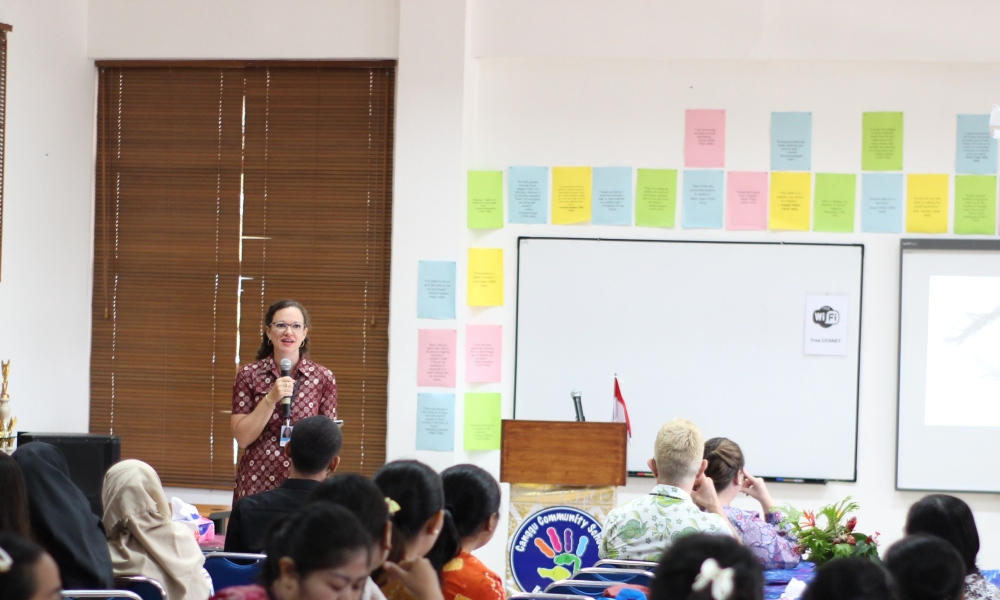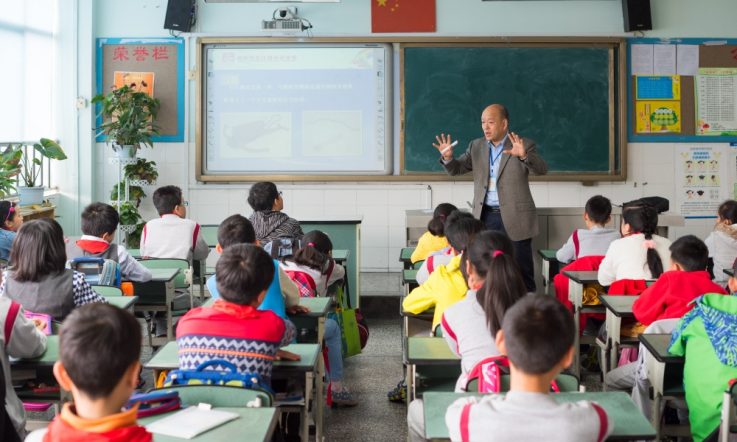The Indonesian Teacher Leaders (ITL) Programme at Canggu Community School (CCS) in Bali is focused on sharing best practice – linking teacher leaders experienced in best teaching practices in inquiry with teachers in the local community, while also providing professional development for their Indonesian colleagues.
CCS is a non-profit Early Years to Year 13 co-ed school offering the International General Certificate of Secondary Education and International Baccalaureate. The campus serves around 460 students from more than 40 countries. The teaching staff also come from across the globe.
Year 5 teacher Monica Steiner facilitated the ITL programme from August 2017 to June 2019. In today's Q&A, she shares details of the professional development initiative and its aims.
I've read that CCS has a commitment to ensuring professional development and learning opportunities are also made available to teaching assistants. How long has this been a focus?
Professional development has always been a priority at CCS since its founding and, presently, most PD opportunities are given in-house by dedicated and qualified teachers. The teaching assistants have to be qualified teachers to be able to work in an International School in Bali. In the classrooms here, we have expat teachers and Indonesian teaching assistants (who are qualified teachers). Some positions, such as Coding, are taught only by Indonesian teachers. We also have Indonesian teachers who teach Bahasa Indonesia (Indonesian Language classes).
The idea for specialised PD for our teaching assistants came several years ago under the previous school principal and director, Warren Bowers and Beccy Fox. Their vision was to provide a small group of teaching assistants with PD opportunities and this group was called 'Teachers in Transition'. These teachers would meet weekly, prepare PD for each other and better their individual teaching practice. Warren and Beccy also utilised Charlotte Danielson's Enhancing Professional Practice book as a tool to help teaching assistants to set yearly goals to work towards.
Why is it important to provide these opportunities?
Our teaching assistants are qualified teachers, however they needed more training in updated teaching methods. We also noticed that although the Teachers in Transition teachers were becoming highly skilled, the other teaching assistants were often dismissed from staff meetings and were not receiving the same amount of professional development. Since PD was in the school Strategic Plan for all teachers, we felt more was needed. We believed that teaching assistants often have different needs and should be allowed time and space to be able to make goals and work towards them in that context. At the end of the 2016-17 school year, the Teachers in Transition program was transformed into the Indonesian Teacher Leaders (ITL) Program.
How does the ITL work and how has it developed over the years?
During the 2017-18 school year, the ITL group planned PD sessions and workshops for their Indonesian colleagues (both teachers and teaching assistants) weekly. The members met weekly on Thursdays, presented part of their PD session to the ITL group and received feedback and suggestions on how to improve. Then, on the next Monday, they presented their PD to their Indonesian colleagues at the staff meeting after school. Towards the end of the second term the ITL members sent a survey to their colleagues to find what topics they needed the most help with or what new skills they wanted to learn. Once that information was gathered, planning for Terms 3 and 4 were tailored around those goals. They also offered two options of weekly sessions to better meet the needs of all Indonesian staff members.
In April of 2018, the ITL teachers held a workshop at CCS for local teachers in the community. Six teachers presented workshops on different topics to over 40 local teachers on a Saturday afternoon. During that workshop one local teacher asked how she could join the ITL program and it got the group thinking how we could do more for teachers in the local community all year, not just once a year. This led to further planning for 2019.
No funding is needed for in-house PD's. The workshop was funded by both the Yayasan (governing school body) as well as from the Indonesian Department of Education.
Can you give an example of some of the training sessions?
Since the beginning of the 2018-19 school year, the ITL group has continued offering PD sessions for their Indonesian colleagues. One member in the group also offered PD to his expat colleagues about coding. The group has worked with local teachers in the Canggu area and we are partnering our ITL teachers with the local school teachers. They come to CCS once a month to observe and/or receive PD sessions from our ITL teachers. Our teachers will also go to visit the local teachers in their schools to both learn from them and help them further implement their goals within their classrooms.
All teachers and teaching assistants must set yearly goals. The ITL group has taken their colleagues' goals and are preparing PD and observation opportunities to help their colleagues reach their yearly goals. In the first semester, the sessions were tailored around these goals. In the second semester, we offered a PD session one week and then a workshop session the following week to further allow teachers and assistants time to prepare materials, practise skills and collaborate further. We found that many teachers and teacher assistants were unable to implement the skills and practices fully because of time constraints. We are hopeful the workshop sessions will alleviate that.
Most sessions are hands-on, with the participants utilising the strategies and skills instead of just listening to someone talking about them. Materials are shared either in print or digital form, depending on the need. ITL teachers also are required to observe colleagues related to their yearly goal at least once per term. They then use the information learned towards mastering their goal. They also observe each other at least twice a year and collaborate afterwards to receive feedback.
Our workshop in May this year was an absolute success. We had 65 teachers from the local community attend and the ITL teachers gave more choices for workshops. The theme was Visible Thinking and Inquiry-Based Methods.
How does this approach benefit everyone at the school and in the wider community?
It has been just amazing to see how much growth these teachers have made and most of it was just because of a change in mindset. They finally feel like they're valued and recognised as being master teachers, both in our classrooms and within the community. They also feel more empowered. Their willingness to try new teaching techniques is always present and their likelihood to reach their yearly goals has increased as well. The ITL teachers are seen as leaders in the school and are always there to help their peers when needed. They are looked at for leadership positions and counted on in more ways than one.
Classroom teachers are happy with the skills they're learning and have noticed an increase in student literacy and numeracy levels due to increased student-teacher/teaching assistant time. Assistants are used more-so now as second teachers in the classroom versus administrative assistants as they were in the past.
The students, parents and school community see the teaching assistants more as teachers and give them more respect because of this. Overall, the program has been a huge success and we hope to continue it in the years to come. With the empowerment of Indonesian staff, everyone in the school community is better off.
As a teacher, where are your own areas of expertise? Do you share this with your colleagues?
As a school leader, what opportunities exist to partner with other schools? How could you work together to share teacher expertise and hold professional learning events?

